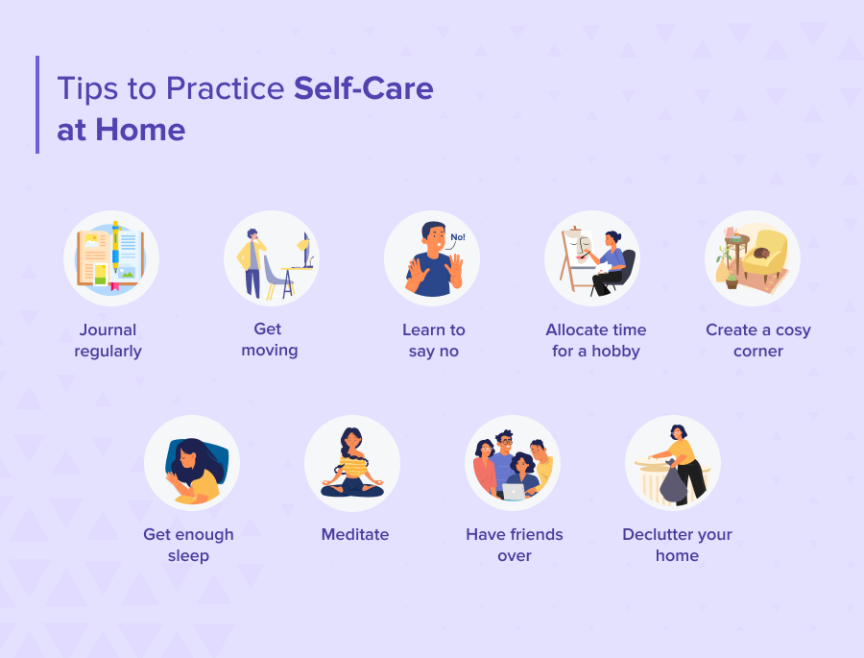Learn why leading HR professionals trust ekincare! Explore Now

In a fast-paced life focused on career success, it is easy to let your mental health take a backseat. Even in our spare time, we prioritise things like entertainment and family needs over taking care of our mental health which is essential for our well-being in the long run.
While the good news is that there is a conscious movement towards bettering physical health, the same cannot be said for mental health. One reason is that many simply accept stress, anxiety, and feeling burnt out as a path to success. It doesn’t have to be this way. Even those who are aware of these dangers often have no clue about how to take care of their mental health.
So, here are some simple psychology-based self-care tips that don’t take a lot of time or money but will still have a huge positive impact on your mental health.

If you can pick only one of the nine tips we are giving here, I recommend you pick up journaling. A journal allows you to unload your thoughts and feelings every day, without needing to worry about what others think.
Research has shown that journaling provides several benefits, including better moods, increased feelings of well-being, and reduced stress levels. If you aren’t sure how to get started with journaling, try setting aside some time before bed each night to simply pour down your thoughts and feelings. Journal prompts are available online for free, and you can also look up writing exercises to help get your mind flowing.
You don't have to hit the gym or do high-intensity interval training. Just getting up and moving regularly works wonders for your mental health. Studies have shown that even moderate physical activity can help reduce stress levels, lift your mood, and improve sleep quality.
Here’s a pro tip for you. Pick an activity that you love to do. It could be cycling, running, dancing, or swimming. When you enjoy doing it, you will have less trouble getting started and get more endorphins (happy chemicals) out of it!
It's hard to say no to social commitments and obligations, but learning to prioritise your own needs is an important part of self-care. Saying no to not-so-necessary things gives you more time and energy to focus on your own needs – whether that’s taking time for reflection, getting enough sleep, or spending time with loved ones.
If you find it difficult to say no even when your schedule gets too full, try setting some explicit boundaries with others to help you manage your time better. For example, you might clarify that certain obligations take priority over others, or you might set a regular day each week when you don't take on any new obligations.
Hobbies aren’t just for school kids. It’s more important to have hobbies as an adult as they help you take your mind off everyday worries. They help us keep our creative side alive and can give us a sense of contentment.
Try setting aside a little time each day to do something you love. Whether it’s reading, gardening, or playing a musical instrument, finding the time to practise your hobby can help you cope with stress and feel more connected to yourself.
Having a dedicated corner to relax or wind down makes it much easier for you to get into relaxation mode. Create a comfortable and inviting space in your home the way you like it. You could simply prep the couch for this by throwing some pillows, lighting a couple of candles nearby, and playing some soothing music. The only rule is that you aren’t allowed to worry about your everyday stresses.
Sleep allows your body and mind to rest and recharge, giving you the energy you need to tackle each day with renewed focus. According to research you need at least 7-9 hours of sleep each night in order to function at your best. Avoiding screens before bed, not having caffeine late in the day, and exercising regularly can all help you get better sleep. Creating a relaxing bedtime routine can also be helpful for getting your mind into a calm state before going to sleep.
Meditation is a simple but powerful way to reduce stress and improve your well-being. There are many meditation forms, from guided meditation apps to mindfulness exercises. Whether you prefer sitting in silence or listening to guided meditations, setting aside just a few minutes each day can have a big impact on your mental health. Trust me, it's not overrated.
When was the last time you had your friends over just to hang out? Spending time with friends is a great way to relax and recharge, and it can also help strengthen your support network. Whether you host a dinner party or just enjoy some quality time together over coffee, taking the time to connect with others can be an important part of self-care.
Living in a cluttered environment can increase stress levels and make it harder to focus on the things that matter. Decluttering your home is a simple way to create more space and reduce everyday stress. Whether you start with a small area of your house, like your closet or kitchen, or commit to tackling a larger project, taking the time to declutter can be a powerful way to take care of yourself.
These tips aren’t one-time fixes for your mental health. Rather, these are low-effort, psychological self-care habits you should incorporate into your daily life—their positive effects compound. Of course, you don’t have to practice all of them. Just pick the ones that resonate with you the most and get started. Your mind and body will thank you!
Schedule a demo to learn how your organisation can get the best employee health and well-being experience with ekincare's commitment to quality.